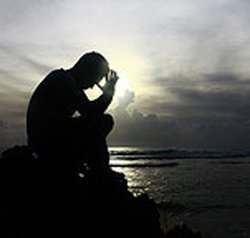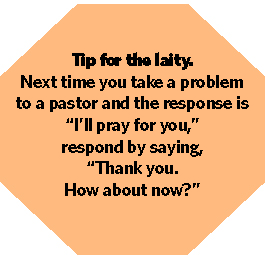Teach Us to Pray
 Why do people go out of their way to ask preachers to pray for them?
Why do people go out of their way to ask preachers to pray for them?
Pastor Jon Swanson points to 1 Chronicles where David outlines the duties of the Levites. One of the duties is to stand every morning to thank and praise the Lord.
OK, it’s their job. But it is our job, too.
Each of us can pray. The littlest toddlers find comfort and empowerment in bowing their heads in pray. (Comfort and empowerment are answers to prayer.)
Over the rocky years of life, we tend to lose confidence in God and confidence in our ability to speak to God. The relationship is broken.
Easy way out: assign the duty to those we feel are especially trained to do this.
When you set aside one group of people to perform a function that each person is capable of doing, the result is predictable. The larger group is going to lose its skills. Prayer is a pretty important skill—one we don’t want anyone to lose!
Another predictable result. The designated pray-ers will accept status and power. Over time, they will get lazy about their responsibilities and the prayers will become corporate in nature. Prayers will be written a year in advance, published, distributed to congregations, and read by the designated pray-ers, who no longer have to know the names and faces of the people they pray for. People will feel further lost and separated from God as their individual needs are grouped with the whole, undefined people of God.
The church must work at restoring people’s relationships — not so much with the Church but with God.
We all feel small before God and in our self-loathing we tend to think that clergy are somehow better. They are not. Clergy are servants just like every other child of God. They are capable of both good and bad. Putting them on a pedestal as the official representative of God results in scandals that grab secular headlines when things get really bad.
Clergy are charged with fostering spirituality. They are not surrogates. That kind of thinking led to the travesties that inspired Martin Luther to risk his life with his 95 Theses. Back then, people were encouraged to pay clergy to pray for them. The more money, the better the prayer. Maybe that’s what we have returned to today without using the word “indulgence.”
The disciples felt inadequate. They came to Jesus. “Teach us to pray.”
The church does not always do a good job of teaching us to pray. The laity is often OK with this. We want to know how to pray, but not if it means practicing. . . in public.
At this point we can learn from musicians. They know that no amount of practice behind closed doors can teach the skills that are easily honed playing in public.
One pastor we heard during our Ambassador visits exhorted her congregation to ration their prayers. Don’t bring your little concerns to God, she admonished. Save God for the big things.
Perhaps she meant to empower the congregation to solve their own problems, but it is definitely short-changing God. God is God. He’s not asking us to save Him time and trouble. God wants us to call upon Him. God can handle little things along with big! Nevertheless, I am sure God smiles with satisfaction when we get up from our knees and help!
 There is only one way to change this. Put the responsibility for prayer into the hands of the people. Teach them to pray. Teach by example. Give lots of opportunity for practice.
There is only one way to change this. Put the responsibility for prayer into the hands of the people. Teach them to pray. Teach by example. Give lots of opportunity for practice.
Instead of glibly promising to pray for people who come to you in distress—as a way of dismissing their concerns—stop in your tracks, take their hands, and pray with them, asking them questions in the prayer so that their answers are a voice directed at God.
Then don’t wait for magic. Prayer provides comfort and empowerment! Roll up your sleeves. Lace up your boots. Put on your gloves. Go to work! Love your neighbor!
See if those prayers aren’t answered!
Teach us to pray.
